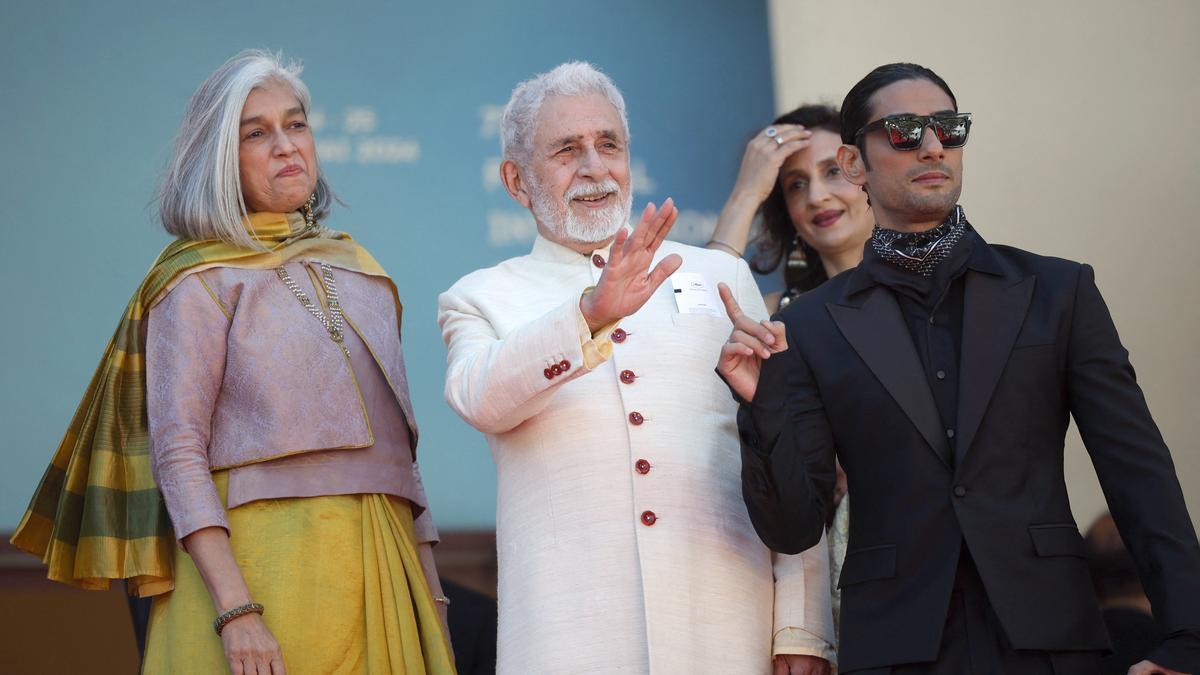
The iconic veteran Bollywood couple, Naseeruddin Shah and Ratna Pathak Shah, made an exhilarating entry at the 77th Cannes Film Festival on Saturday, causing a wave of excitement and admiration among international cinema enthusiasts and the global paparazzi. Their presence illuminated the red carpet during the screening of the legendary filmmaker Shyam Benegal’s celebrated movie “Manthan,” a film that holds a special place in the annals of Indian cinematic history.
Naseeruddin Shah was a vision of timeless elegance in a pristine white sherwani, accented with maroon buttons, artfully blending tradition with a hint of regal sophistication. Beside him, Ratna Pathak Shah radiated grace in her own meticulously chosen saree, paired with a lavender-hued, custom-crafted blouse. This unique attire was not just a fashion statement but also a nod to sustainability, being handwoven from recycled cotton and dyed with natural plant extracts.
Adding to this mesmerizing tableau were Prateik Babbar, the talented actor-son of the late veteran actress Smita Patil, and Nirmala Kurien, daughter of the legendary Dr. Verghese Kurien. Prateik’s sartorial choice was a sleek black tuxedo, elevated by an emotionally resonant accessory—his late mother’s beautifully patterned silk scarf, a heartfelt homage to her enduring legacy. Nirmala Kurien’s stunning blue saree with a striking red pallu likewise drew appreciative glances, embodying a blend of traditional elegance and modern sensibilities.
The red carpet event was notable not only because of the starry line-up but also due to the significant cultural milestone it marked. Accompanying the esteemed actors were key figures from the film’s cast and crew, including director Shyam Benegal, film historian Shivendra Singh Dungarpur, and various family members. The event set the stage for the screening of the restored version of “Manthan,” a film that continues to inspire and provoke thought even decades after its original release.
“Manthan,” originally released in 1976, is a cinematic masterpiece inspired by the milk cooperative movement led by Dr. Verghese Kurien. Kurien’s pioneering efforts transformed India from a milk-deficient nation into one of the world’s leading milk producers, a journey that culminated in the creation of the celebrated dairy brand Amul. This historical context brings an additional layer of significance to the film, which was co-written by Shyam Benegal and the esteemed playwright Vijay Tendulkar.
Remarkably, “Manthan” holds the unique distinction of being entirely crowdfunded by 500,000 farmers, each contributing Rs 2, a grassroots effort that underscores the powerful nexus between art, society, and collective empowerment. Such was the resonance of the film’s narrative and its production ethos that it bagged two National Film Awards in 1977—Best Feature Film in Hindi and Best Screenplay for Tendulkar. The film’s recognition extended beyond Indian borders, as it became India’s official entry for the Best Foreign Language Film category at the 49th Academy Awards in 1976.
The Cannes screening of “Manthan” was not merely a retrospective celebration; it was a moment to reflect on the movie’s breathtaking achievements and its forward-looking vision. The restoration of the film, driven by the Film Heritage Foundation under the stewardship of Shivendra Singh Dungarpur, ensures that new generations of cinephiles can experience the magic and message of this cinematic gem.
Prominent personalities attending the premiere included Jayen Mehta, Managing Director of Amul, whose presence symbolized the enduring legacy of Dr. Kurien’s work portrayed in the film. Their accolades underscore the importance of preserving such cultural treasures, and their participation at Cannes highlighted India’s burgeoning role in the global cultural dialogue.
As the evening unfolded, the camaraderie and shared reverence for “Manthan” were palpable. The assembled luminaries extolled the film’s contributions not only to cinema but also to the social fabric of India. The restored version of “Manthan” promises to captivate both old fans and new viewers, continuing its journey as an enduring testament to the power of collaborative spirit and visionary leadership.
In an era where the film industry is increasingly driven by commercial imperatives, the story behind “Manthan” serves as a powerful reminder of cinema’s potential to effect meaningful societal change. The Cannes Film Festival, with its global platform, provided the perfect venue to celebrate not just the film but the values it stands for. For Naseeruddin Shah, Ratna Pathak Shah, and everyone associated with “Manthan,” the evening was not just an acknowledgment of past glory, but also a signal of continued relevance and inspiration for future storytellers.
Thus, the screening of “Manthan” at Cannes was more than an event; it was an evocative tribute to a timeless narrative and a celebration of the unifying power of cinema.












